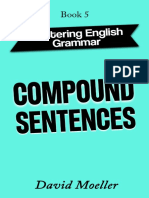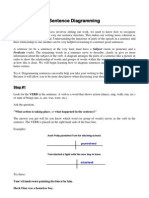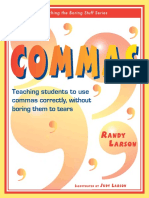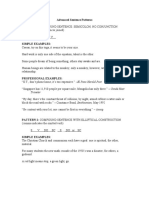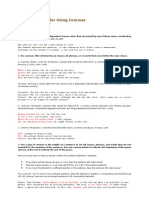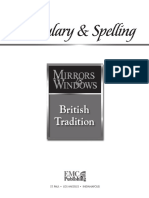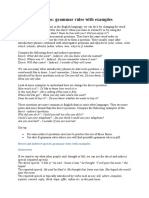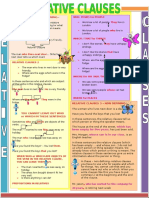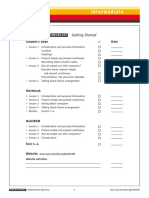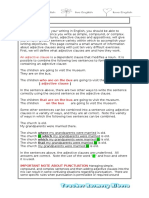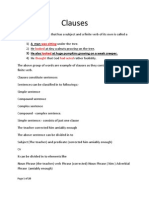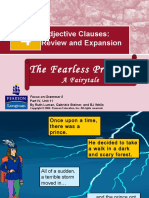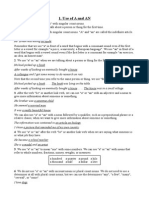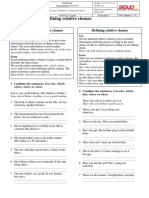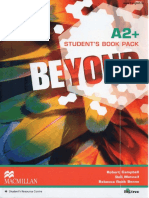1
Contents
10 Modes of Modifiers................................................................................................ 1
Correcting Run-On Sentences..................................................................................... 1
Subjects, verbs, adjectives, adverbs, and conjunctions..............................................2
To find the subject................................................................................................... 2
To find the verb....................................................................................................... 2
To find an adjective................................................................................................. 2
To find an adverb..................................................................................................... 2
To find demonstrative pronouns.............................................................................. 2
Diagramming modifiers........................................................................................... 2
Intransitive Verb...................................................................................................... 3
Transitive Verb......................................................................................................... 3
To find a Direct Object............................................................................................. 3
Object Complement................................................................................................ 4
To find an indirect object......................................................................................... 5
Prepositional Phrases.................................................................................................. 5
Participle & Gerund Phrases....................................................................................... 5
Relative Clauses......................................................................................................... 6
Prepositional, Participle, Gerund, and Infinitive Phrases.............................................6
Simple sentences, complements, appositives, and prepositional and verbal phrases6
All elements from Practice 1 plus adjective, adverb, and noun clauses.....................6
10 Modes of Modifiers
Modifiers can also be classified into these categories:
1. Initial dependent clause: Even though I was tired, I went for a walk.
2. Initial infinitive phrase: To calm down, I went for a walk.
3. Initial adverb: Immediately, I went for a walk.
4. Initial participial phrase: Trying to distract myself, I went for a walk.
5. Mid-sentence appositive: I, in an effort to calm down, went for a
walk.
6. Mid-sentence participial phrase: I, trying to distract myself, went for
a walk.
7. Terminal present participial phrase: I went for a walk, hoping to
distract myself.
8. Terminal past participial phrase: I went for a walk, soothed by the
breeze.
9. Terminal resumptive phrase: I went for a walk a walk that did me
good.
10.Terminal summative phrase: I went for a walk, an activity that calmed
me down and distracted me from my troubles.
Correcting Run-On Sentences
There are five ways to correct fused sentences and commas splices.
1. Add a comma + coordinating conjunction: Dogs are fun, and they like to play.
2. Add a semicolon: Dogs are fun; they like to play.
3. Add a semicolon, a conjunctive adverb, and a comma: Dogs are fun; indeed, they
like to play.
4. Separate the sentences with a period: Dogs are fun. They like to play.
5. Add a subordinating conjunction or a relative pronoun: Dogs are fun when they
like to play.
There are correlative conjunctions, coordinating conjunctions and subordinating
conjunctions
�2
coordinating conjunctions: for, and, nor, but, or, yet, so.
Either/ or: Either she will quit, or she will work longer hours. Neither/ nor: Neither
Onley nor Pete knows how to fix the stove. As/ as: The wind is as cold as ice. Such/
that: Such is Gaoyus happiness that he bought all of us dinner. Both/ and: Both
Hansel and Gretel ate too many sweets.
Hess, Amy Lynn (2014-01-22). Diagramming Sentences: A Playful Way to Analyze Everyday Language
(Kindle Locations 447-455). Gypsy Daughter. Kindle Edition.
Subjects, verbs, adjectives, adverbs, and conjunctions
To find the subject
We ask who or what is something or is doing something.
To find the verb
We look for the word or words that show action or a state of being.
To find an adjective
Adjectives tell us what kind? How many? Which one? Whose?
To find an adverb
Adverbs tell us how? When? Where? To what extent?
To find demonstrative pronouns
Demonstrative pronouns tell us which one? Which ones? When used as adjectives,
these are called pronominal (pronoun) adjectives.
1. That pair of jeans is very stiff.
2. He needs to wash these shoes.
3. Those sandals are too expensive.
Diagramming modifiers
Sues little dog walks carefully.
dog
walks
The dog leaps playfully
dog
leaps
Intransitive Verb
An action verb that does not require an object (a noun or pronoun) to receive the
action of the verb
1. Dora babysits.
2. The children play, and Dora laughs.
3. Each player plays well.
Transitive Verb
An action verb that has an object (a noun or pronoun) receive the action of the verb
You can write a sentence with a transitive verb in the active voice, or it can be
written in the passive voice. The active voice places emphasis on the subject, the
do-er of the action, and the passive voice places emphasis on the object.
�4
1. Active voice:
a. The babysitter watched the children.
Passive voice:
b. The children were watched.
2. Active voice:
a. The quarterback passed the ball.
Passive voice: The ball was passed
To find a Direct Object
A direct object receives the action of a transitive verb. - A direct object will always
be a pronoun or a noun (or a word or group of words that acts like a noun).
to ask What? or Whom? after the verb: Ask "[ Verb] what?" or "[ Verb] whom?"
Object Complement
Unlike an object complement, which will always follow a direct object, an indirect
object will always come before the direct object in a sentence. Remember, a
sentence must have a direct object in order to have an indirect object.
To find an indirect object
To whom? or For whom? after the verb plus the direct object: Ask "[ Verb] [Direct
object] for whom?" or "[ Verb] [Direct object] to whom?" Notice, however, that to
or for does not appear in the sentence before the indirect object.
Dad gave mom hugs
TYPES OF SENTENCES - DECLARATIVE, IMPERATIVE,
EXCLAMATORY, AND INTERROGATIVE
Type of sentence
Declarative
Definition
Declarative sentence
Example
Victoria purchased a video
Imperative
Exclamatory
Interrogative
makes statements
Imperative sentence
makes demands or
requests
Exclamatory statements
make important or
exciting statements
Interrogative sentences
ask questions
camera
Hand me the instruction
manual
The camera is falling!
Did Victoria catch the
camera
Auxiliary verbs
To be verbs
Am
Is
Are
Was
Were
Be
Being
Been
To have verbs
Have
Has
Had
Interrogative sentences
To do verbs
Do
Does
Did
Modal verb
Shall
Will
Should
Would
May
Might
Must
Can
Could
Prepositional Phrases
A prepositional phrase is made up of a preposition, the object of the preposition
(noun or pronoun), and any words that modify the object of the preposition
(adjectives or articles).
A prepositional phrase is a phrase that can be used as
-
An adjective to modify a noun or pronoun
An adverb to modify the verb, an adjective, or another adverb
A nominative, or a noun phrase
The airplane stops at the gate, and the captain helps passengers down the ramp
�10
�11
The best time of day is before dawn.
�12
�13
A squirrel is in the tree.
Under the bush, the squirrel eats an apple.
After lunch is homework time.
Captain Jim is behind the door.
Jose is under the weather.
My favorite garden is in Savannah.
Jack is on top of the roof.
She's on the elevator.
Alice fell into the puddle.
The soup smells like Mom's house.
�14
�15
PREDICATE NOMINATIVES, PREDICATE ADJECTIVES AND LINKING
VERBS
Predicate Nominative
As stated above, in this chapter we're going to look closely at nouns that follow
linking verbs and complement the subjects of their sentences. This special kind of
noun is called a predicate noun or a predicate nominative. A predicate nominative is
one type of subject complement.
Predicate Adjective
The second type of subject complement is the predicate adjective. Predicate
adjectives also follow linking verbs and complement their subjects. The difference
between a predicate adjective and predicate nominative is simply the part of
speech: one is an adjective, and the other is a noun.
Linking Verbs
Although predicate nominatives and predicate adjectives are different parts of
speech, they have something in common. Both types of subject complements follow
linking verbs. So far we have been diagramming example sentences and practice
sentences that contain only action verbs. Now we will learn about the second type
of verb, which is the linking verb.
She looks content and sleepy
�16
Participle & Gerund Phrases
Examples of Phrases
Prepositional phrase: On the ferry, Sam proposed to Linda.
Infinitive phrase: To run near the lake is her favorite activity.
Gerund phrase: Running near the lake is her favorite activity.
Appositive phrase: Gerald, her favorite student, gave her flowers.
Participle phrase: The spot reserved for running is beautiful.
A gerund can have its own object, also called a verbal complement. Find the verbal
complement by asking What? after the verbal.
An infinitive can function in a sentence as a noun, an adjective, or an adverb: The
infinitive can be a subject, object, complement, or modifier. An infinitive can also
have a verbal complement.
�17
�18
As shown in the previous table, verbals will function in a sentence as any noun,
adjective, or adverb will function. Therefore, a verbal may appear as a subject, in
the predicate as a complement or object, as a modifier, or as a verbal phrase with
its own verbal complement.
�19
�20
�21
Simple sentences, complements, appositives, and
prepositional and verbal phrases
Appositive
Appositive nouns are either restrictive or non-restrictive. A restrictive appositive is
essential to the meaning of a sentence. A non-restrictive appositive is extra, or
parenthetical information about the preceding noun
�22
Expletives
When a sentence begins with "There," Here, or "It," and a form of the verb to
be," the sentence is said to have an expletive
�23
Compound, Complex, and Compound-Complex Sentences
Cinderella cleaned the oven, and she dug the well
Cinderella was exhausted because she dug the well.
This is the horse that Jason rides.
Relative Clauses
We will now study relative pronouns, pronominal adjectives (pronouns used as
adjectives), and the subordinating conjunction.
Begin relative clauses, which are dependent clauses that behave like adverbs or
adjectives within a sentence. These pronouns connect a clause to its antecedent,
the person, place, thing, or idea to which the pronoun refers.
�24
�25



